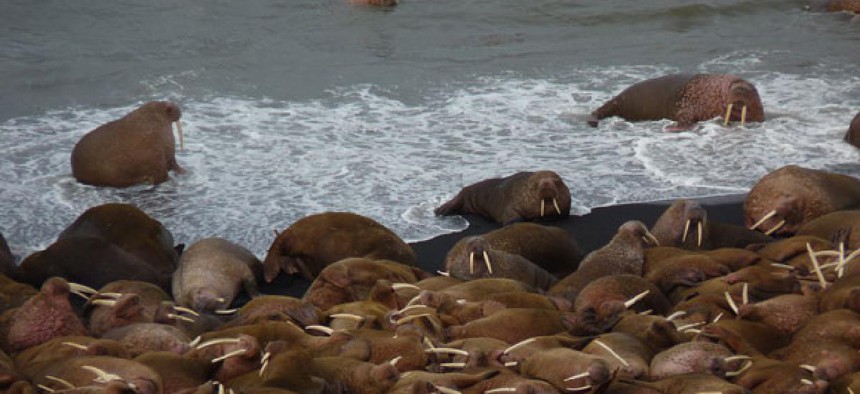
Sea ice has been decreasing in places like Alaska's Becharof National Wildlife Refuge. United States Fish and Wildlife Service
EPA Funding Reductions Kneecap Environmental Enforcement
In two years, Congress cut EPA’s budget by a whopping 18 percent, from $10.3 billion to $8.5 billion.
Republicans have spent the past two years on the warpath against the Obama administration’s Environmental Protection Agency. As the EPA rolled out an ambitious slate of rules aimed at stopping climate change and curbing power-plant pollution, Republicans on the campaign trail and Capitol Hill slammed the agency as the embodiment of government overreach and so-called “job-killing regulations.”
Despite the outrage, the GOP’s efforts to stop the agency’s agenda haven’t succeeded—all of the many bills to block or delay EPA’s new regulations have failed in Congress.
But lawmakers have found another way to strike out at the agency they love to hate—by slashing its budget. Over the past two years, Congress has cut EPA’s budget by a whopping 18 percent, from $10.3 billion to $8.5 billion. And that’s not counting the effects of the across-the-board spending cuts that took effect with sequestration Friday.
Cutting the agency’s budget doesn’t take away its obligation to enforce environmental laws and implement new regulations, but it has dramatically weakened and slowed EPA’s ability to fulfill its mandate. And the cuts have come just as President Obama is preparing to ramp up efforts to tackle climate change. That will be a huge struggle—EPA’s budget cuts have already sapped the agency of money for the staff, training, travel, and technology needed to enforce existing environmental-protection rules.
“Enforcement has really taken it on the chin,” said Adam Kushner, a former director of EPA’s Office of Civil Enforcement who now practices at the law firm Hogan Lovells.
Kushner and others point out that in order to enforce environmental regulations, staffers must be able to travel to sites such as coal plants or water bodies; to use high-tech tools to determine pollution levels; to review complex technical documents; and more. At least some of that work requires in-house training. And money to do all of it is declining.
“It means laws about environmental enforcement are just paper,” Kushner said.
Budget-cutting is an age-old means for lawmakers to influence the executive branch. “One of the ways you can affect policy is by denying money,” said Steve Ellis, vice president of the watchdog group Taxpayers for Common Sense. “They couldn’t undo the regulations. So they bled the funding. It’s not a new tactic. It’s been done at other agencies in other times.”
Republicans have made clear this is exactly their strategy. Here’s what Rep. Mike Simpson, R-Idaho, chairman of the House Appropriations subcommittee that funds EPA, said about last year’s spending bill: “Wherever I go, the biggest complaint I hear about the federal government is how the EPA is creating economic uncertainty and killing jobs. This bill includes provisions to address some of these issues.”
While the Democratic majority in the Senate has restored some of the EPA funding cut by the Republican-controlled House, the agency has still taken a bigger hit than many others. For example, over the past two years funding for EPA’s climate-change and clean-air programs dropped 9 percent, from $1.1 billion to $1 billion, while funding for water quality fell 29 percent, from $5.6 billion to $4 billion.
Those cuts appear to have had a measurable impact on levels of environmental cleanup. According to agency data, EPA programs stripped 410 million pounds of pollutants from the air in 2010; the amount dropped to 250 million pounds in 2012. In the same two-year period, the volume of contaminants removed from U.S. waters was cut in half, from 1 billion pounds to 500 million pounds. Hazardous wastes eliminated from the environment fell from 11.8 billion pounds in 2010 to 4.4 billion pounds in 2012.
Reduced environmental enforcement has real consequences, said Frank O’Donnell, president of the group Clean Air Watch. “It’s a fundamental problem,” he said. “EPA has been given more and more responsibility, but not the adequate resources."
“In theory, it’s been given all this power,” O’Donnell said. “In reality, it’s a paper tiger.”
This article appeared in the Monday, March 4, 2013 edition of National Journal Daily.






